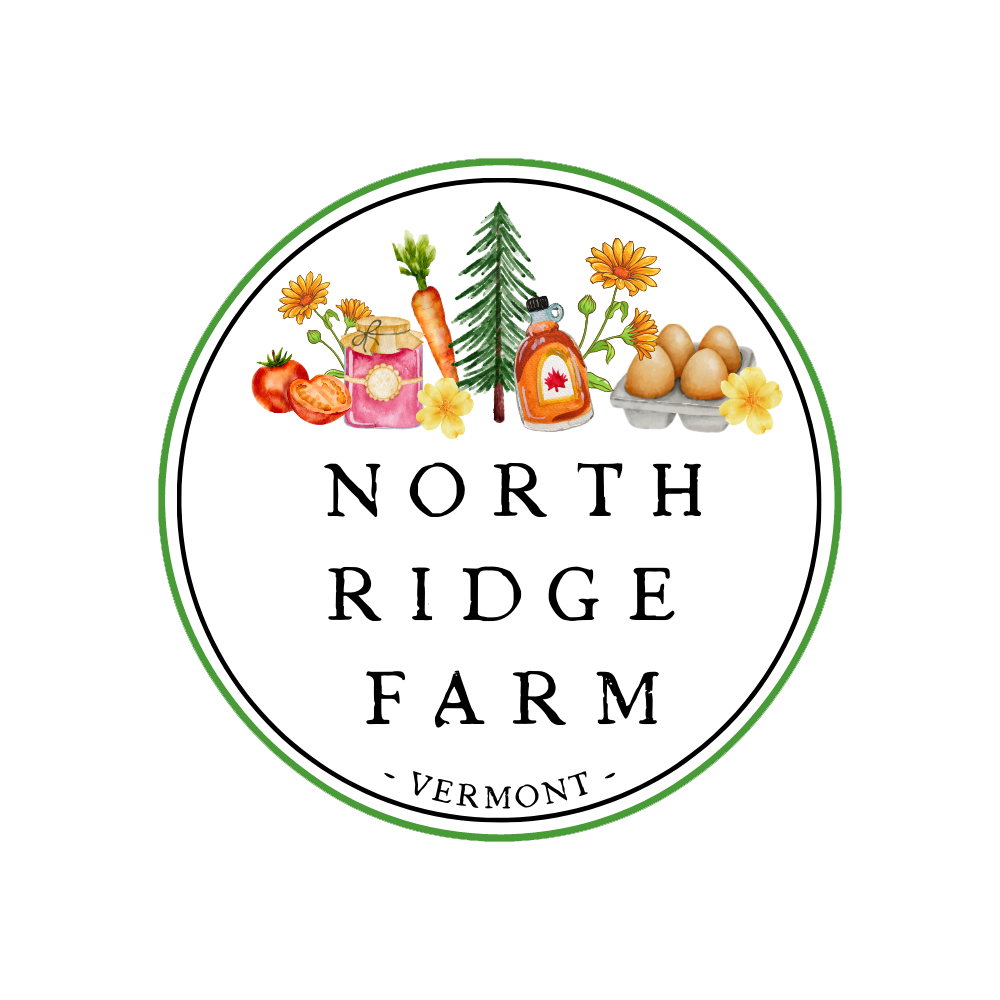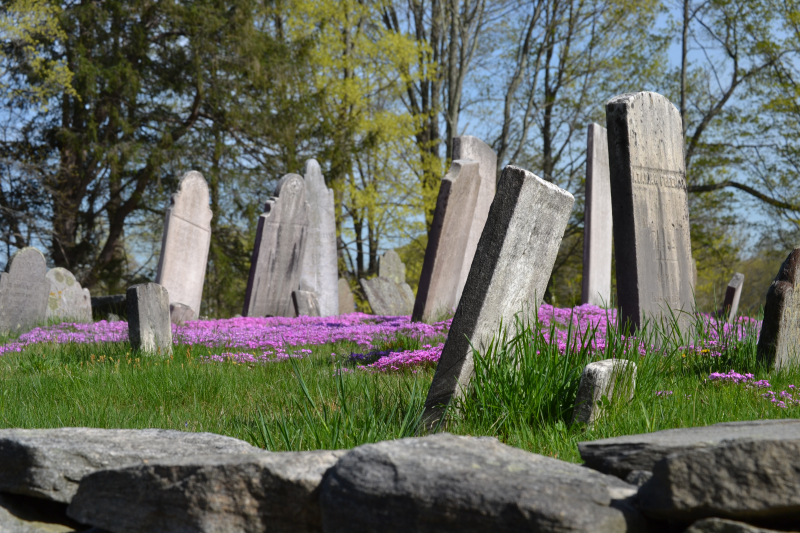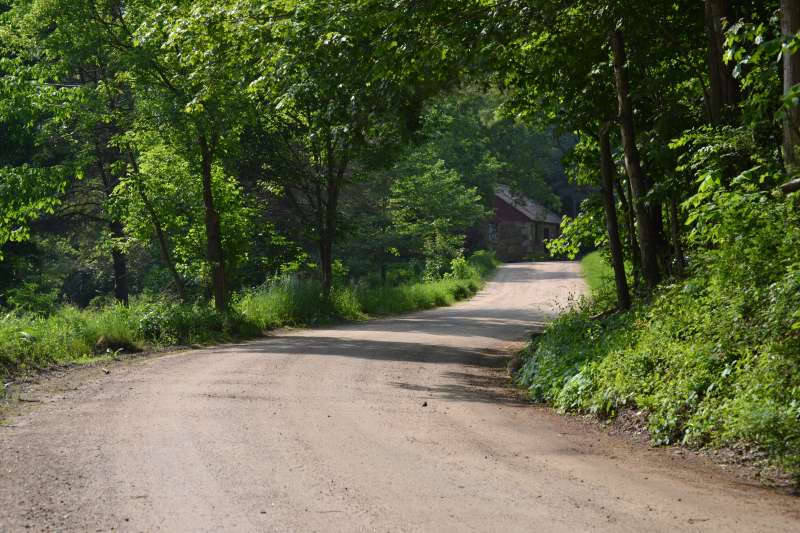Funerals are different in northern Maine. They are community affairs and chances are, every person you interact with in the planning process – from the priest to the funeral director to the church secretary to the florist – will have known the deceased. If you’re choosing a casket, you can be sure the funeral home has chamo-lined models in stock. If cremation was your wish, how about a solid oak vault with a hand-carved 8-pointer buck or trout on the side?
Nearly every detail of dad’s funeral felt different than the funerals I’ve attended in Connecticut. Not by our design, but by regional traditions.
The church secretary, who helped plan the funeral, offered mom her lakefront rental property to out of town family, at no charge. The florist may have been short on flowers, but it’s northern Maine, an abundance of evergreen with just a few colorful accents would do. Nobody stressed about this. Who expects calla lilies this remotely in January?
If you go to someone's house for dinner in northern Maine, the entire affair will likely take place in under an hour, from your arrival to the meal served to dishes washed and shoes put on as you walk out the door. There is no dilly-dallying in Eagle Lake. So I guess we shouldn’t have been surprised when they told us it is the norm to have calling hours in the morning with an immediate procession to the church for the funeral mass. They are not the type to turn such things into a two day affair. The expediency actually worked in our favor as we knew much of our family was traveling 500 miles to attend; time was precious.
It’s fairly common nowadays to create a PowerPoint type slideshow of photos and memories to be played on loop at the funeral home. My experience has been that it is usually played in an out of the way spot, not in direct proximity to the immediate family or the deceased. Not in northern Maine, however. Two large flat-screens were mounted high on the wall, prominently placed in either corner at the front of the room, right above dad, the evergreens, the simple flowers, and our entire family. To say we were initially dubious about the placement of those screens is an understatement. But, I’ve got to tell you, it worked. The slideshow we’d prepared coupled with background music we had playing (a custom compilation of old-time country music dad’s brother had gifted to him the summer prior. Think old country: Patsy Cline, Bill Monroe, Conway Twitty, Ray Price…) As it turned out, the music paired with the vibrancy of so many great family photos brought incredible life to the room. A few months after, I spoke with my uncle who made that cd about the flat-screens, and he shared that he, too, was not so sure about them at first, but once they started playing, and the music filled the room, it could only be described as perfect. It really was.
You won’t find a “car service” to escort immediate family from the funeral home to the church as is the norm in Connecticut. But, you will likely have a cousin who is a state trooper in attendance, and he will escort the procession from funeral home to church. He will also call in assistance to help the poor car that was absorbed by a snowdrift as they kindly pulled to the side of the road to give your group plenty of room. Man those snowdrifts suck you in.
In Connecticut, it is customary to have a luncheon catered, usually at the church, immediately following the funeral mass. In northern Maine, there aren’t many catering services to be found (if any), so the tradition is for the “church ladies” to prepare and serve a home cooked meal for lunch. There is no charge for this service, but rather those in attendance put a “tip” in the jar at the beginning of the buffet line so the ladies may pay for supplies. It was incredibly awkward to think our guests would pay for their lunch, but for folks in northern Maine, this is the norm. (As I write this, I realize I never explained this custom to our out of state family and friends. I wonder if they thought we were charging them for lunch? Ha! And, oops!)
Also, funerals in northern Maine are community affairs. Everybody goes.
Speaking of church ladies: My father received military honors during the funeral mass, and while I’ve experienced this moving tradition many times, never in quite the way it was done at dad’s funeral. You see, we were just on the heels of a bomb cyclone, and given that it was literally 20 below a day prior, the outdoor 21-gun salute was not going to happen. Not because we wouldn’t have all stood outside for it, but because guns can be temperamental under such extremes and you want those sort of things to go according to plan. So, inside, at the front of the beautifully decorated church, the honor guard dutifully performed the flag ceremony surrounded by pin-drop silence. At least, until the church ladies could be heard bustling about in the next room, clanging pots and pans, fussing over last minute details as they knew a church full of hungry parishioners was about to descend. At first it was one of those oh no kind of moments, and I watched as the funeral director swiftly moved from the back of the church through the door to the parish hall, to hush the commotion. It didn’t work. Those ladies had business to take care of! I quickly found it completely endearing. How perfect, and how very Eagle Lake. You don’t mess with routines up there, especially when the St. Mary’s church ladies are on a mission.
Once Taps began, we could no longer hear activity from the kitchen, so our attention returned to the ceremony before us. In my experience, military honors normally happen graveside, where everyone aside from immediate family is standing. We did not have graveside service, and given the cancelled outdoor ceremony, we all remained seated in the pews, until Taps began. Then, as is customary, those who have served in the armed forces, stood in full salute. This tradition is not as prominent when we’re all standing graveside, where it is more likely to blend in. Here, with the rest us seated, only past and present soldiers stood, prompted only by their deeply ingrained training. Seated in the front row, I only noticed because the semi-circle seating design of the church allowed me to catch a glimpse in my periphery. I slowly looked over each shoulder, taking in a well populated church peppered with heels-together, hand-to-brow comrades, saluting the flag, and saluting the life of my father, one final time.
One last thing: My father’s funeral is the only one I’ve attended where the eulogy was delivered at the very beginning of the service. In my experience they are tucked in toward the end. We even questioned the church secretary's suggestion, but were assured this is how it is done there, and it is done so deliberately as it “sets the tone” and “brings the loved one and their life front and center in the room.” She was right. Now I can’t imagine a funeral being organized any other way.
______________________________
Thank you for your thoughtful replies on my last post. I’d like to extend my heartfelt sympathies to those of you feeling pain over the loss of a loved one. I feel ill-equipped to write much of any substance on the matter of death and grief, but I will say the work of Stephen Jenkinson has helped corral my thoughts and inclinations over the years, and most recently, through his book Die Wise. Some of you might find his work meaningful, too.
I don’t view death as an unthinkable experience to be feared. We all depart in one of two ways: we either see it coming or we don't. That’s it. Death is a promise. For me, it is not the shock of death nor the wrongness of it, indeed, death is as right as being born. It is the sheer missing of someone that at times can feel insurmountable, but, there too, beauty is found.
I’m afraid I did not explain myself well in my last post, so please allow me to try again: My stuckness is not related to feeling stuck in grief, it is more related to feeling stuck on whether or not to write more on the topic of my father’s passing. The events surrounding it. I'm a noticer, and writing down what I notice helps to process and remember. But how much is too much? That's been my dilemma (which many of you so graciously put at ease). Grief and loss are always present, but it does not hold me down. For me, grief is not about sorrow or anger or asking why, it is simply about missing someone more than I knew was possible. If anything, I feel overwhelming gratitude for having a father who was such a positive force, that all I can feel in his absence is sincere fondness for the good lessons, the good role model, the good memories. For that, I count myself among the lucky.


